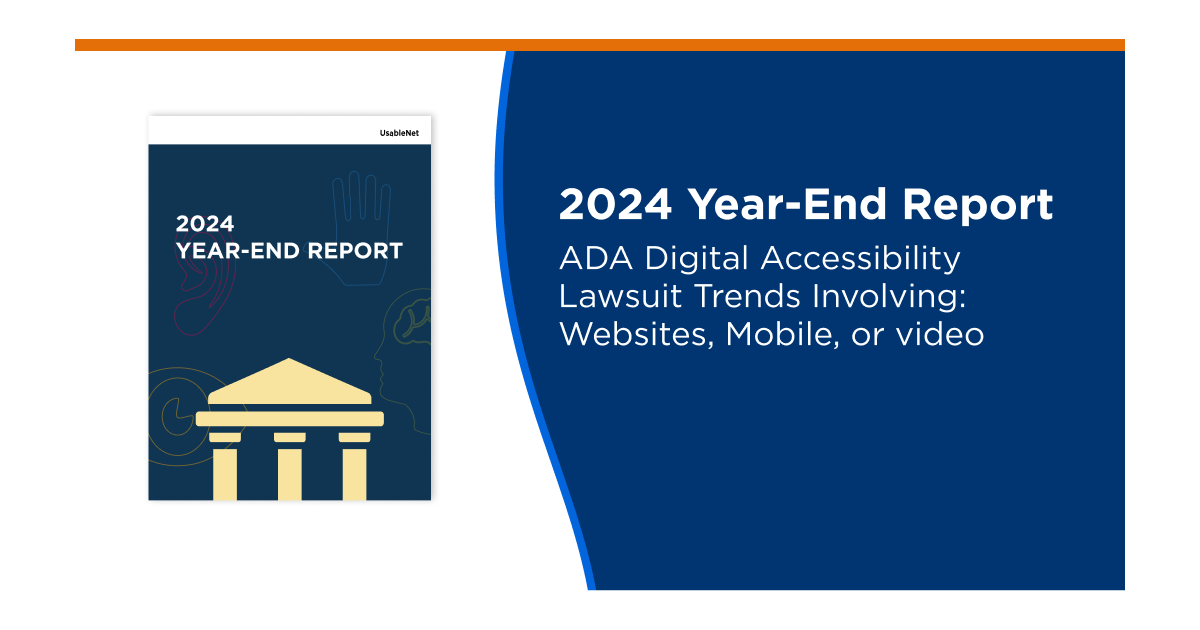You might have heard about the recent class action lawsuit against accessiBe. If you're using or considering accessibility widgets, this could be a game-changer for you.
If you are not familiar with this case, you can click here to read a full write-up from the blog of The Law Office of Lainey Feingold.
What Happened?
On June 24, 2024, Tribeca Skin Care, a small dermatology practice in New York City, filed a class action lawsuit against accessiBe. Despite using accessiBe's overlay, a blind person sued Tribeca for not meeting ADA requirements. This case highlights the risks of relying on these tools.
Widget vendors like accessiBe promise to address accessibility issues with just a few lines of code. However, as of mid-year 2024, over 20% of digital accessibility lawsuits were filed against companies using accessibility widgets. Widget vendors may not be able to provide the protection from lawsuits or ADA compliance they claim.
The Mid-2024 Digital Accessibility Lawsuit Report is here. Download your copy now!
Why Accessibility Overlays and Widgets Might Not Work
- Lack of True Accessibility
Widgets often use automated fixes that only address some of the nuances of your site. They tweak HTML and offer a control panel for CSS but miss deeper issues like JavaScript interactions. - Inadequate Verification and Testing
Unlike other solutions, widgets don't verify their efficacy. You're left to ensure your website is accessible. Many website owners cannot perform the testing to verify that the widget is properly making the site accessible. - Interference with Assistive Technologies
Overlays can interfere with a user’s assistive technologies, such as screen readers, forcing them to interact with new technology rather than the tools they're familiar with. - Misleading Marketing
Many companies claim they can deliver full ADA compliance. However, many lawsuits against websites using vendors demonstrate that these claims may not protect you from complaints. - Lack of Accountability
Accessibility widget providers often avoid responsibility for their tools' effectiveness. If issues arise, you will likely find you are on your own. - Feedback from the Disability Community
Organizations like the National Federation of the Blind (NFB) have opposed these tools. They argue that overlays can make websites more challenging to use. Click here to read a Forbes article that discusses the NFB's ban and includes the NFB's statement.
→ Click here to use AQA and find out if your website is accessible.
A Better Approach: UsableNet Assistive
Here's how UsableNet Assistive can help you:
- Manual Remediation - Our developers and platform manually fix your website's code according to WCAG criteria, ensuring HTML to JavaScript is accessible.
2. Thorough Verification- We use automated and expert testing as well as feedback from people in the disability community to ensure your site is accessible.
3. Focus on Usability - We ensure users can accomplish tasks using assistive technologies like screen readers.
4. Legal Support - If your site is sued for accessibility, we provide robust legal support to help you defend the claim.
Three steps to take right now
1. Evaluate Your Current Accessibility Solution- Look at whether your site's accessibility tool truly meets ADA standards.
2. Consult with Accessibility Experts- Contact professionals for a comprehensive review and actionable recommendations.
3. Choose a Reliable Accessibility Partner - Consider partnering with UsableNet for manual remediation, thorough testing, and ongoing support.
Learn More and Take Action
To dive deeper into why widgets might not be the best solution for your digital accessibility and how UsableNet Assistive can help, check out these resources:
- Uncovering Challenges of AI Widgets for Website Accessibility [Video]
- Why Widgets Are Not Best For Digital Accessibility [Blog Post]
Contact UsableNet Today
Make your website genuinely accessible and ADA-compliant. Contact us for a free consultation and demo of our solutions. Don't risk legal action or alienate people with disabilities—let us help you make a positive change now. Book a meeting










